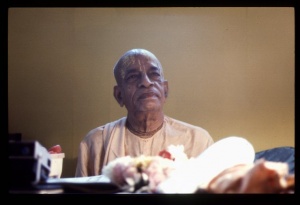SB 10.38.17: Difference between revisions
m (1 revision(s)) |
(Vanibot #0054 edit - transform synonyms into clickable links, which search similar occurrences) |
||
| (One intermediate revision by one other user not shown) | |||
| Line 1: | Line 1: | ||
{{info | {{info | ||
|speaker= | |speaker=Akrūra | ||
|listener= | |listener=Akrūra thinking to himself | ||
}} | }} | ||
[[Category:Srimad-Bhagavatam - Canto 10 Chapter 38]] | |||
[[Category:Bhagavatam Verses Spoken by Akrura - Vanisource|103817]] | |||
<div style="float:left">'''[[Srimad-Bhagavatam]] - [[SB 10|Tenth Canto]] - [[SB 10.38: Akrura's Arrival in Vrndavana|Chapter 38: Akrūra's Arrival in Vṛndāvana]]'''</div> | |||
<div style="float:right">[[File:Go-previous.png|link=SB 10.38.16]] '''[[SB 10.38.16]] - [[SB 10.38.18]]''' [[File:Go-next.png|link=SB 10.38.18]]</div> | |||
{{RandomImage}} | |||
{{SBnotice}} | |||
==== TEXT 17 ==== | ==== TEXT 17 ==== | ||
<div | <div class="verse"> | ||
samarhaṇaṁ yatra nidhāya kauśikas | :samarhaṇaṁ yatra nidhāya kauśikas | ||
tathā baliś cāpa jagat-trayendratām | :tathā baliś cāpa jagat-trayendratām | ||
yad vā vihāre vraja-yoṣitāṁ śramaṁ | :yad vā vihāre vraja-yoṣitāṁ śramaṁ | ||
sparśena saugandhika-gandhy apānudat | :sparśena saugandhika-gandhy apānudat | ||
</div> | </div> | ||
| Line 17: | Line 22: | ||
==== SYNONYMS ==== | ==== SYNONYMS ==== | ||
<div | <div class="synonyms"> | ||
''[//vanipedia.org/wiki/Special:VaniSearch?s=samarhaṇam&tab=syno_o&ds=1 samarhaṇam]'' — the respectful offering; ''[//vanipedia.org/wiki/Special:VaniSearch?s=yatra&tab=syno_o&ds=1 yatra]'' — into which; ''[//vanipedia.org/wiki/Special:VaniSearch?s=nidhāya&tab=syno_o&ds=1 nidhāya]'' — by placing; ''[//vanipedia.org/wiki/Special:VaniSearch?s=kauśikaḥ&tab=syno_o&ds=1 kauśikaḥ]'' — Purandara; ''[//vanipedia.org/wiki/Special:VaniSearch?s=tathā&tab=syno_o&ds=1 tathā]'' — as well as; ''[//vanipedia.org/wiki/Special:VaniSearch?s=baliḥ&tab=syno_o&ds=1 baliḥ]'' — Bali Mahārāja; ''[//vanipedia.org/wiki/Special:VaniSearch?s=ca&tab=syno_o&ds=1 ca]'' — also; ''[//vanipedia.org/wiki/Special:VaniSearch?s=āpa&tab=syno_o&ds=1 āpa]'' — attained; ''[//vanipedia.org/wiki/Special:VaniSearch?s=jagat&tab=syno_o&ds=1 jagat]'' — of the worlds; ''[//vanipedia.org/wiki/Special:VaniSearch?s=traya&tab=syno_o&ds=1 traya]'' — three; ''[//vanipedia.org/wiki/Special:VaniSearch?s=indratām&tab=syno_o&ds=1 indratām]'' — rulership (as Indra, the King of heaven); ''[//vanipedia.org/wiki/Special:VaniSearch?s=yat&tab=syno_o&ds=1 yat]'' — which (lotus hand of the Lord); ''[//vanipedia.org/wiki/Special:VaniSearch?s=vā&tab=syno_o&ds=1 vā]'' — and; ''[//vanipedia.org/wiki/Special:VaniSearch?s=vihāre&tab=syno_o&ds=1 vihāre]'' — during the pastimes (of the ''rāsa'' dance); ''[//vanipedia.org/wiki/Special:VaniSearch?s=vraja&tab=syno_o&ds=1 vraja]-[//vanipedia.org/wiki/Special:VaniSearch?s=yoṣitām&tab=syno_o&ds=1 yoṣitām]'' — of the ladies of Vraja; ''[//vanipedia.org/wiki/Special:VaniSearch?s=śramam&tab=syno_o&ds=1 śramam]'' — the fatigue; ''[//vanipedia.org/wiki/Special:VaniSearch?s=sparśena&tab=syno_o&ds=1 sparśena]'' — by their contact; ''[//vanipedia.org/wiki/Special:VaniSearch?s=saugandhika&tab=syno_o&ds=1 saugandhika]'' — like an aromatic flower; ''[//vanipedia.org/wiki/Special:VaniSearch?s=gandhi&tab=syno_o&ds=1 gandhi]'' — fragrant; ''[//vanipedia.org/wiki/Special:VaniSearch?s=apānudat&tab=syno_o&ds=1 apānudat]'' — wiped away. | |||
</div> | </div> | ||
{{SBcollapse}} | |||
==== TRANSLATION ==== | ==== TRANSLATION ==== | ||
<div | <div class="translation"> | ||
By offering charity to that lotus hand, Purandara and Bali earned the status of Indra, King of heaven, and during the pleasure pastimes of the rāsa dance, when the Lord wiped away the gopīs' perspiration and removed their fatigue, the touch of their faces made that hand as fragrant as a sweet flower. | By offering charity to that lotus hand, Purandara and Bali earned the status of Indra, King of heaven, and during the pleasure pastimes of the rāsa dance, when the Lord wiped away the gopīs' perspiration and removed their fatigue, the touch of their faces made that hand as fragrant as a sweet flower. | ||
</div> | </div> | ||
| Line 31: | Line 36: | ||
==== PURPORT ==== | ==== PURPORT ==== | ||
<div | <div class="purport"> | ||
The Purāṇas call the lotus found in the Mānasa-sarovara Lake a saugandhika. Lord Kṛṣṇa's lotus hand acquired the fragrance of this flower by coming in contact with the beautiful faces of the gopīs. This specific incident, which occurred during the rāsa-līlā, is described in the Thirty-third Chapter of the Tenth Canto. | The ''Purāṇas'' call the lotus found in the Mānasa-sarovara Lake a ''saugandhika''. Lord Kṛṣṇa's lotus hand acquired the fragrance of this flower by coming in contact with the beautiful faces of the ''gopīs''. This specific incident, which occurred during the ''rāsa-līlā'', is described in the Thirty-third Chapter of the Tenth Canto. | ||
</div> | </div> | ||
__NOTOC__ | </div> | ||
</div> | |||
<div style="float:right">[[File:Go-previous.png|link=SB 10.38.16]] '''[[SB 10.38.16]] - [[SB 10.38.18]]''' [[File:Go-next.png|link=SB 10.38.18]]</div> | |||
__NOTOC__ | |||
__NOEDITSECTION__ | |||
Latest revision as of 18:54, 17 February 2024

A.C. Bhaktivedanta Swami Prabhupada
Please note: The synonyms, translation and purport of this verse were composed by disciples of Śrīla Prabhupāda
TEXT 17
- samarhaṇaṁ yatra nidhāya kauśikas
- tathā baliś cāpa jagat-trayendratām
- yad vā vihāre vraja-yoṣitāṁ śramaṁ
- sparśena saugandhika-gandhy apānudat
SYNONYMS
samarhaṇam — the respectful offering; yatra — into which; nidhāya — by placing; kauśikaḥ — Purandara; tathā — as well as; baliḥ — Bali Mahārāja; ca — also; āpa — attained; jagat — of the worlds; traya — three; indratām — rulership (as Indra, the King of heaven); yat — which (lotus hand of the Lord); vā — and; vihāre — during the pastimes (of the rāsa dance); vraja-yoṣitām — of the ladies of Vraja; śramam — the fatigue; sparśena — by their contact; saugandhika — like an aromatic flower; gandhi — fragrant; apānudat — wiped away.
Translation and purport composed by disciples of Śrīla Prabhupāda
TRANSLATION
By offering charity to that lotus hand, Purandara and Bali earned the status of Indra, King of heaven, and during the pleasure pastimes of the rāsa dance, when the Lord wiped away the gopīs' perspiration and removed their fatigue, the touch of their faces made that hand as fragrant as a sweet flower.
PURPORT
The Purāṇas call the lotus found in the Mānasa-sarovara Lake a saugandhika. Lord Kṛṣṇa's lotus hand acquired the fragrance of this flower by coming in contact with the beautiful faces of the gopīs. This specific incident, which occurred during the rāsa-līlā, is described in the Thirty-third Chapter of the Tenth Canto.